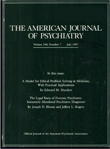Stress reactivity in bipolar patients and its relation to prior history of disorder
Abstract
OBJECTIVE: Two questions were posed: Does stress precipitate episodes of bipolar I disorder, and does sensitivity to stress differ in episodes later in the course of illness compared to early ones? METHOD: Fifty-two patients with bipolar I disorder were followed longitudinally for up to 2 years; clinical course was monitored, and interview assessments of life events were made every 3 months. RESULTS: The patients who had episodes of illness during follow-up had experienced significantly more severe stressors and more total stress in the preceding 6 months, and more total stress in the preceding 3 months, than those without episodes. Inconsistent with Post's stress "sensitization" hypothesis, patients with more prior episodes were more likely to have episodes following major stressors, and they relapsed more rapidly. CONCLUSIONS: Stressors may precipitate episodes of bipolar illness, especially for patients with more prior episodes. Different versions of the stress sensitization model remain to be tested.



